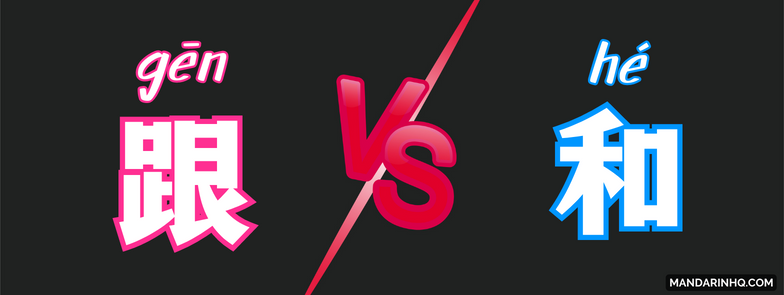Summary Of "The differences between 跟 (gēn) and 和 (hé)" From The Video Above
In today's lesson, we're gonna tackle a common grammar question:
When is 跟(gēn) and 和 (hé) not interchangeable?
Both these characters mean "and" or "with," but there are situations where they cannot be used interchangeably. So, let's dive in and learn the differences!
跟 (gēn)
First, let's talk about 跟 (gēn). 跟 is primarily used to indicate "with" or "and" when talking about actions or events involving two or more people or things. Here are some examples:
1. 我跟他一起去公园。(Wǒ gēn tā yīqǐ qù gōngyuán.) - I went to the park with him.
2. 她跟我去咖啡馆。(Tā gēn wǒ qù kāfēiguǎn.) - She is going with me to the coffee shop.
和 (hé)
Now, let's move on to 和 (hé). 和 is used to connect nouns, indicating "and" or "with" when listing items or people. For example:
1. 我喜欢茶和咖啡。(Wǒ xǐhuan chá hé kāfēi.) - I like tea and coffee.
2. 小飞和小王都是我的朋友。(xiǎo fēi hé xiǎo wáng dōu shì wǒ de péngyou.) - Xiaofei and Xiaowang are both my friends.
When 跟 and 和 are not interchangeable:
So, as we’ve seen, 跟 is used when referring to actions or events, while 和 is used to connect nouns.
- 跟 (gēn): Actions and events
- 和 (hé): Listing items or people
So while both 跟 and 和 can mean "and" or "with," they are not interchangeable in certain situations.
Here are some examples to illustrate the differences:
If you want to say: They are father and son.
- Incorrect: 他们是父亲跟儿子 (Tāmen shì fùqīn gēn érzi)
- Correct: 他们是父亲和儿子 (Tāmen shì fùqīn hé érzi)
If you want to say: I learn Chinese with Alex. (Alex is your Chinese teacher.)
- Incorrect: 我和Alex学中文。 (Wǒ hé Alex xué zhōngwén.)
Alex and I learn Chinese. (Both of you are learning Chinese.)
- Correct: 我跟Alex学中文。(Wǒ gēn Alex xué zhōngwén.)
I learn Chinese with Alex. (Alex is your Chinese teacher.)
The word 跟 (gēn) also carries the meaning of "to follow," implying a sequential aspect.
So, If you want to say: Read after me.
- Incorrect: 你和我读。 (Nǐ hé wǒ dú.) - You and I read together.
This means you and I read at the same time.
- Correct: 你跟我读。 (Nǐ gēn wǒ dú.) - You read after me.
This means I read first, then you read after me.
Now you know the differences between 跟 and 和 and when they can't be used interchangeably. Remember, 跟 is used for actions or events, while 和 is used to connect nouns. Keep practicing, and you'll master this grammar point in no time!
You might also find these posts interesting:

